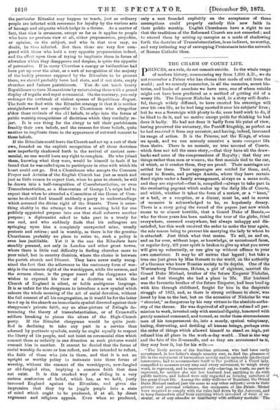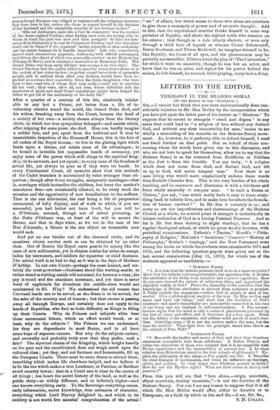THE CHARM OF COURT LIFE.
DRINCES, as a rule, do not commit suicide. In the whole range of modern history, commencing say from 1,600 A.D., we do not remember a Prince who has chosen that mode of exit from the world ; and we scarcely remember, in all the memoirs, secret his- tories, and books of anecdote we have seen, one of whom suicide might not have been predicted as a method of getting rid of a Weary life. The Emperor Nicholas is said, in a story still doubt- ful, though 'widely diffused, to have exerted his sovereign will over his own life, as he had long-exerted it over his subjects' lives ; but he was a Sovereign with plenty to do, even hard work to do, if he liked to do it, and no motive except-pride for thinking he had done it badly. He had not d'ote it badly from his point of view, having preserved the autocracy, the Pontiff-kingship, as perfect as he had received it from any anceitor, and having-, indeed; increased its range of action. It is the Princes, not the kings, or whom we speak, and we can scarcely conceive a more ennuyant life than theirs. There is no memoir', no true account of Courts, which does not tell the same story,—that they have all the draw- backs and none of the compensations of Royalty ; that they are things rather than men or women, the first menials tied to the car, of which, as it crushes them, they are proud. 'Their marriages are settled for them. Their appanages are settled for them, and, except in Russia, and perhaps Austria, where they have certain fixed rights under a family arrangement, always on a mean scale, and they are expected—that is, compelled----always to take part in the everlasting pageant which makes up the daily life of Courts, and which, whether it takes the form of a review, era "hunt," or a ball, or a reception, or a dinner, must be, and in scores of memoirs is acknowledged to be, so hopelessly dreary. There is a story going the round of the papers just now which seems to us almost horrible, that a Gran-d Duke of Russia,— ' who for three years has been making the tour of the globe, feted 'everywhere, caressed everywhere, but always nnhappy and dis- satisfied, has this week received the order to make the tour again, the sole reason being to prevent his marrying the lady to -whom he is attached. Just think what that means. To sail, on and on, and on for ever, without hope, or knowledge, or accustomed facers, or regular duty, till your spirit is broken to give up what you never will give up voluntarily, or can give up without offence to your own conscience. It may be all untrue that legend ; but take a true one just given by Miss Burnett to the world, on the authority of a German who knew Russian society to its depths. One of the Wurtemburg Princesses, Helena, a girl of eighteen, married the Grand Duke Michael, brother of the future Emperor Nicholas, and at first thought she had a place in life. Her husband was the favourite brother of the future Em_peror, had been bred up with him through childhood, fought for 'him in the desperate struggle of 1825, and, as there is strong evidence to show, was loved by him to the last, but on the accession of Nicholas he was "shunted," as dangerous by his very virtues to the absolute autho- rity of the throne. He was deprived of all power, refused all per- mission to work, invested only with nominal dignity, honoured with purely nominal command, and turned, as under those circumstances men of his temperament do„ into a moody, cynical voluptuary, hating, distrustiug, and deriding all human beings, perhaps even the order of things which allowed himself to stand so high, yet refused him all place in the work-a-day world. That is the way and the fate Of the Romanoffs, and 83 they are accustomed to it, they may bear it, but for his wife;— "The lively nature of the Suabian princess, who had been early accustomed, in herfather's simple country seat, to find the .ploasure of life in the enjoyment Of harmonious society and in agreeable intellectual intercourse, had to accommodate itself to the position of a Court lady, compelled to measure every step and every movement, to weigh every word, to represent, and to represent only—having, ieitruth, no,part to represent, for neither she nor her husband had anything todn,sItth public matters, and indeed wore only regarded as forming m,enibers of the great Court life. Among the sixty-millions of Russ-tine; the `ifiand Duke Michael ranked just-the same as am/ other subject ; 'evert in their private and personal relations, the occupants of the ,PalaisMilael were required to comply with the rules laid down by the Autocrat,, and to keep themselves aloof from anything which savoured of want of re- straint, or of any abandon or familiarity with ordinary mortals. The young Grand Duchess was obliged to renounce all the religions interests that were dear to her, unless she chose to expose herself to the derision of her husband and the Unarbiable severity of her brother-in-law." . . . . . . 'Ella set dbAingude, male elle a rair de s'ennuyer,' was the verdict of the keen-sightedCustine, after, having once seen the young wife, to whom in truth the part was now and then assigned 'de faire lee hon- neurs de la littdrature a la emir de rempereur Nicolas,' and who therefore could not be blamed if she appeared'moms natruelle et plus contrainte que lee nutres femmes de In familia impdriale.' Life was compulsorily passed amid ostentatious pageants, audiences, with official personages, and drives, the object of which was generally a review on the Zaryzin lug (Champ de Mars), and in summer a manceuvre at Krassnoje Ssdlo. The Grand Duke was from early till late tres-oceupd Is no rien faire.' The Grand Duchess had the option either to pass the weary hears alone or in the society of her sister-in-law • to gather round her a circle of agreeable people, and to enliven them after own fashion, would have been re- garded as acrimenlcesa. mojestatis. Even the three daughters who were born to her—and two of whom died very early—could not in anywise fill the void ; they were, after all, not sons, whose initiation into the mysteries of great and small Court regulations might have helped the father to get rid of the uniformity of his daily life."
After a quarter of a century of this life, absolutely intoler- able to any but a Prince, yet better than a life of in- voluntary circuits round the world, the Grand Duke died, and his widow, breaking away from the Court, became the head of a society of her own—a society chosen always from the literary circle, to which her true sympathies belonged—and amidst which, after reigning for some years, she died. Man can hardly imagine a sadder fate, and yet, apart from the habitual and it may be unavoidable despotism of the Roraanoff House, this is the fate of all cadets of the Royal houses,—to live in the glaring light which beats upon a throne, yet retain none of its advantages ; to be bound in invisible but impassable bonds of ceremony, yet enjoy none of the power which still clings to the mystical king- ship; to be servants, and yet equals ; to enjoy none of the freedom of actual life, yet always to pose as if they were its heads. In every Continental Court, all memoirs show that this attitude of the Cadet branches is maintained by rules stronger than eti- quettes ; though after fierce struggles, morganatic marriages—that is, marriages which bastardise the children, but leave the mother's conscience free—are occasionally allowed, to be every week the occasion and the opportunity of new humiliations to the sufferer. That is the one alleviation, the rest being a life of purposeless ceremonial, of lofty dignity, and of work in which, if you are successful, you had better not have lived, for you will be a D'Orleans, accused, though not of actual poisoning, as the Duke d'Orleans was, at least of the will to mount the throne, and that in days when, as we see in the case of the Duo d'Aumale, a throne is the one object no reasonable man would seek.
And yet no one breaks out of the charmed circle, and its members obtain service such as can be obtained by no other class. Out of Russia the Royal caste guards its money like the caste of new millionaires, yet it obtains nobles for aides-de-camps, ladies for tirewomen, and soldiers for equerries or chief footmen. The actual work is,as bad to-day as it was in the days of Madame D'Arblay. In our, own Court—perhaps the most lenient, and cer- tainly the most powerless—duchesses stand like waiting-maids, or rather stand as waiting-maids will not stand, for hours at a time ; the pay is email and the exactions incessant, and yet there ia never want of applicants for situations the middle-class would not condescend to fill. Why ? We understand the old reason that Crowned heads are to be served, as the State is to be served, for the sake of the country and of honour ; but that excuse is passing away all through Europe, and certainly does not apply to the heads of Republics, who find as little difficulty as Kings in filling up their Courts. Why do Princes and -subjects alike bear these ceremonial fetters, which an effort would break, or at least, why do the subjects ? The Princes we can understand, for they are dependants in most States, and in all have some hope of' separate careers. But why do the subjects endure, and avowedly and probably truly aver that they prefer, such a fate? The mystical charm of the Kingship, which weighs heavily on the poor and the uncultivated, does not weigh much upon the cultured class; yet they, and not footmen and housemaids, fill up the European Courts. There must be some charm to attract them, something which makes life elsewhere insipid, and we believe it to be the one which makes a true Londoner, or Parisian, or Berliner avoid country -towns ; that in a Court one is close to the centre of all things ; one hears the secret history of the land, as well as the public story—so widely different, and so infinitely higher--and one knows everything early. To the Sovereign everything comes, early information, secret knowledge, true estimates of character, everything which Lord Hervey delighted in, and which in its entirety is not worth five minutes' comprehension of the actual " set " of affairs, but which seems to those who alone are courtiers to give them a monopoly of power and of accurate thought. Add to this, that the experienced courtier thinks himself in some way partaker of Royalty, and above the highest noble who remains on his estates ; that though as a rule utterly obscure, or seen only through a thick haze of legend, as witness Count Schonvaloff, Baron Stockmar, and Prince Radziwill, he imagines himself to'be, like Royalty, the focus of all eyes, and the phenomenon may ho partially accounted for. Elliston loved the play of "The Coronation," for while it went on smoothly, though he was but an actor, and knew that he was an actor, and sighed for his porter behind the scenes, he felt himself, he avowed, while playing, every inch a King.











































 Previous page
Previous page